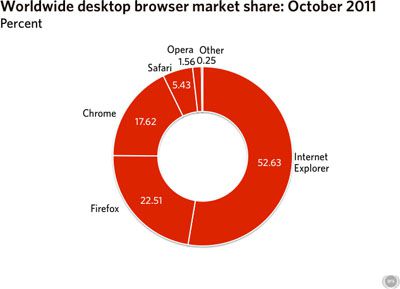It's interesting to notice the 3.04 difference of IE market share. Combined with portable devices, IE drops to 49.59. When looking only at desktops IE drops to 52.63.
Since IE representation on the smart phone and tablet market is extremely low, this 3.04% difference clues us in as to how big the tablet and smart phone devices are on the web. This is so because these 3.04 difference is almost entirely taken by the competing browsers. That is, we can safely say, with some error, that 3.04% is the extent of the portable device impact on the overall web usage.
That can be construed as being an impressive number. But if we consider sales of these devices by far outweigh the sales of desktop computers, it's in fact a very unimpressive and a revealing number that buying an iPad or an Android cellphone is not the same thing as using an iPad or an Android cellphone. And this is exactly something I've been observing for a while. Tablet devices and smart phones usage patterns are a far cry from what their exploding sales would lead us to think. At least in Europe.
Prohibitively expensive internet plans on still a large portion of the world help reduce the web traffic of these devices. But there's also a reason behind their actual usability as a web device. A tablet or cellphone are objects of opportunity that will be mostly used to carry on an internet session for a short period and be done with. They are comparatively clunky to use and have not been able to really replace the desktop extended usage possibilities. They are also highly consumer oriented and offer almost none of the productivity or navigational possibilities of a desktop. So this helps further reduce their reach, because the web consumer market is naturally only a portion of the overall web market.
When I recently asked a friend why he wasn't making much use of his tablet anymore, he told me something like "there's so much mail checking you can do every day on the commuter train, until you realize how pointless that is". He was an early adopter.


